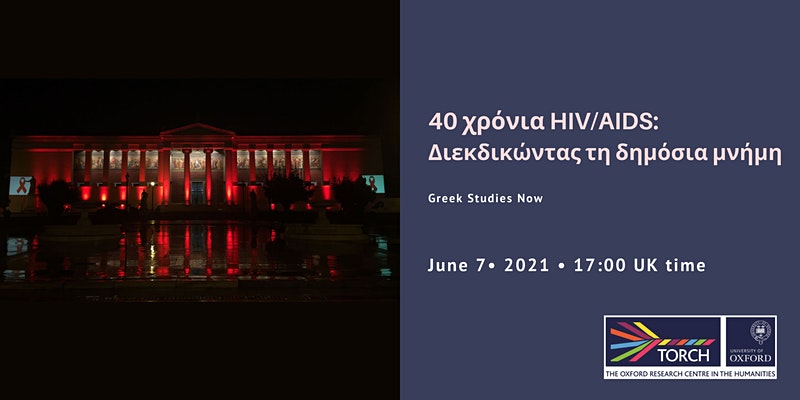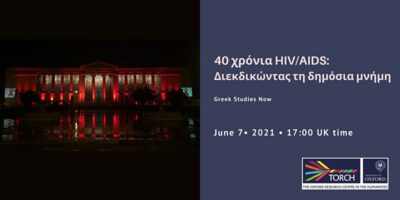
Παρακολουθήστε τη συζήτηση εδώ.

Πόσο μας καλεί να ξανασκεφτούμε την επιδημία του HIV/AIDS, την ιστορία της αλλά και τις ατομικές ιστορίες της;
Σε μια χώρα όπως η Ελλάδα, αυτή είναι πάντα μια δύσκολη συζήτηση και, σε μεγάλο βαθμό, μια συζήτηση που δεν έχει γίνει αρκετά.
Γιατί είναι σημαντικό να ξαναθυμηθούμε τα θύματα του HIV/AIDS και να ανασυστήσουμε το πολιτισμικό αρχείο του τραύματος; Πώς μπορούμε να εμπνευστούμε από τις κατακτήσεις ενός κοινοτικού και ακτιβιστικού αγώνα για τη στήριξη της επιστημονικής έρευνας και την καταπολέμησή του κοινωνικού αποκλεισμού;
Πώς συνδέεται ο διάλογος για το AIDS με τη σημερινή συγκυρία, τη στιγμή μιας άλλης (διαφορετικής μα και με παρόμοια στοιχεία) πανδημίας;
Πόσο σημαντικό είναι να συνεχίσουμε να μιλάμε για την κοινωνική ανισότητα, τη φοβία, το στίγμα και τον αποκλεισμό, όλων αυτών των κοινωνικών προσδιοριστών που συντηρούν και τον HIV ως ένα μείζον ιατρικό και κοινωνικό θέμα;
We will raise such questions in an open discussion co-organized with Positive Voice (“Thetiki Foni” – the Union of People Living with HIV in Greece) and supported by TORCH and the collective Greek Studies Now. Our aim is to talk about the transnational, but also the local experience of HIV/AIDS, an experience that has arguably remained disavowed, especially when it comes to the public memory of people and communities targeted by HIV/AIDS. Our aim is to recollect, but also to demand, public memory: looking back at these last four decades while being propelled into the future.
Register here and you will be emailed a link to join the YouTube live stream where you will be able to submit questions and comments to the panelists
Περισσότερες πληροφορίες σχετικά με την πρωτοβουλία: “Ένα πολιτικό αρχείο για το HIV”:
‘HIV/AIDS in Greece: A political archive’
Knowledge Exchange Fellow:
Dr Dimitris Papanikolaou | Faculty of Medieval and Modern Languages | University of Oxford
Partner Organisation:
Positive Voice/ Thetiki Foni
HIV/AIDS in Greece: A political archive
Both a public engagement programme and a queer archive project, this Knowledge Exchange Fellowship allows Dimitris Papanikolaou and a team of researchers the necessary time and funds to work together with Thetiki Foni (Positive Voice), the Greek Union of People Living with HIV, in order to create the foundations for a community-run ‘HIV/Aids archive’ in Greece.
In the first instance the project addresses a common observation among activists and scholars, that secrecy regarding the disease in the 1980s and 1990s and the absence of sustained public engagement with its impact on the lives of individuals and the Greek queer community, belie deeper anxieties over public health, and sexual and dissident identities. It also points towards a tendency of kinship networks to substitute and close(t) down functions of the public sphere. AIDS in Greece very much remained “a family matter”, and the secrecy often surrounding it also meant a lack of public mourning for its victims, as well as the disavowal of the political ramifications a more public fight against HIV/AIDS could have had in Greek society. Retelling the cultural and social history of HIV/AIDS in Greece today, therefore, also means remembering efforts that have tried to render the fight against the disease more public in the past, as well as their official or unofficial undermining; reconstructing important scenes of (community) trauma, stigma and survival; collecting unclaimed memorabilia, cultural texts, testimonials. The current project cannot exhaust all these undertakings, but it can certainly open the discussion, and lay the foundations for a public and participatory archive. The initial steps of the fellowship have also helped us realize that such an undertaking directs itself to a series of interrelated (and similarly disavowed) archives, among others:
- an archive of gender and kinship and their role in Greek society
- an archive of homophobia and (often institutionalized) racism
- an archive of queer subcultures and community
- an archive of gender violence
- an archive of feelings.
For all those reasons, the social history of HIV/AIDS cannot but be thought of as a political archive, whose importance and topicality become all the more felt today in Greece; only last March, for instance, Thetiki Foni’s main checkpoints in Athens became the target of an arson attack by unidentified assailants.
In public talks and roundtables that will take place throughout 2019-2020 (culminating in March – June 2020), the project will therefore address this perceived lack in the public history of HIV/AIDS in Greece. It will ask why this lack occurred in the first place. It will try, through activist engagement, scholarly exchange and public dialogue, to add to the existing narratives of the impact of the disease on Greek society with a specific reference to the queer community. Last, but not least, it will contemplate the difficulties of addressing this history today, and its political ramifications.
Two further undertakings will be the main objectives of the project during the year
a) the publication and ongoing development of a website (that will go live in February 2020 and will be further built up during the year of the fellowship). It will provide short bibliographical essays on various aspects on HIV/AIDS in Greece (from an overview of published scholarship, to a discussion of literature, theatre and cinema; from accounts of past community projects to overviews of media panics and official campaigns). The website, at the same time, will serve as a hub for the collection of further material, testimonials and written reflections.
b) the foundation of an archival collection run by Thetiki Foni; it will document its own history and activities, but also expand to include material and testimonies related to HIV/AIDS in Greece since the 1980s. The aim of the fellowship is to help Thetiki Foni decide on the status and exact nature this collection will take, and to learn from the experience and the difficulties of its foundation. It is hoped that the full organization of such a larger and expansive archive will be the objective of a future related research project.